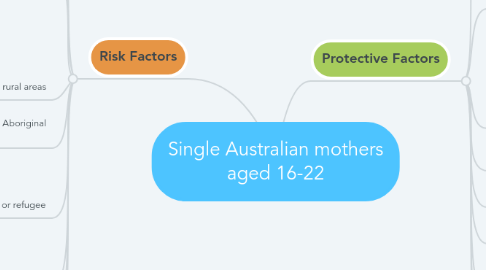
1. Risk Factors
1.1. Poor mental health
1.1.1. Substance abuse
1.2. Being a victim of domestic/family violence
1.2.1. Children of these parents who are victims of violence are more likely to suffer from psychological problems [boys: 1.90 (1.38–2.61), girls: 1.58 (1.03–2.42)]
1.2.2. Increased risk of drug and alcohol abuse
1.3. Lack of education attainment
1.3.1. Lack of employment opportunities
1.3.1.1. Low income
1.3.1.1.1. Homelessness
1.3.2. Food insecurity and inaccessibility of nutritious food choices.
1.3.2.1. risk of cardiovascular disease, diabetes mellitus type II, stroke, heart disease
1.3.3. Increased risk of smoking and drug and alcohol abuse
1.3.3.1. this poor attainment of education surrounding personal health as well as prenatal health can cause harm to the baby via prenatal tobacco inhalation, as well as second hand smoke postnatally.
1.3.3.1.1. Risk of lung cancer for the mother and baby/child.
1.3.4. Risk of sexually transmitted infections due to lack of knowledge and partaking in unsafe sex
1.4. Living in rural areas
1.4.1. Poor access to healthcare and education facilities
1.4.1.1. lack of knowledge/education attainment
1.5. Different spiritual beliefs: Being Aboriginal or Torres Strait Islander
1.5.1. Lack of trust towards western health
1.5.1.1. Lack of Individualistic approach accustomed to cultural and spiritual beliefs
1.5.1.1.1. lack of employment opportunities
1.6. Being an immigrant or refugee
1.6.1. Language barriers and cultural differences
1.6.1.1. lack of social connectedness in the community
1.6.2. Feeling uncomfortable to tell parents due to cultural beliefs. For example, Indian and eastern societies do not support the idea of abortion
1.7. Being disabled
1.7.1. physical or cognitive impairment
1.7.1.1. May contribute to poor mental health
1.8. Poor parental support
1.9. Religious beliefs
1.9.1. Parents may not support sex before marriage due to their religious belifs such as within the religion of Christianity
1.9.1.1. This may make the female feel frightened to receive help from dissaprovng parents and feel isolated
1.9.1.1.1. May resort to leaving home and be at risk of homelessness
1.9.1.1.2. May cause a decline in mental health
2. Protective Factors
2.1. parent education - pre and post natal care, bonding, security and attachment
2.1.1. This will create parental resilience and increased drive to increase the health of the mother and baby. Furthermore, this may result in the mother's decline in the want to participate in risk-taking behaviours such as alcohol and drug abuse after having the attainment of education relating to the risk and harm of the consequences of such behaviours.
2.1.2. Promotes self care and independence
2.2. Strong social connections
2.2.1. This will result in the decreased risk of primary homelessness, as the single mother may chose to live with friends as a secondary housing option rather than on the streets if she is at risk of homelessness and may in turn be able to get out of the homelessness cycle.
2.2.2. social connectedness and rebuilding relationships where possible to reduce isolation
2.2.3. improve mental health
2.3. Adequate knowledge of parenting and child development
2.4. social and emotional competency of children
2.5. Access to healthcare
2.5.1. Adequate support for mental, physical and social health
2.6. economic stability
2.7. self-care and healthy lifestyle education such as budgeting, nutrition and stress-management
2.7.1. Increase mental health and coping strategies
2.8. Access to education, training and employment
2.8.1. Opportunity to find employment
2.8.1.1. Have an income and be able to provide for themself and the baby

